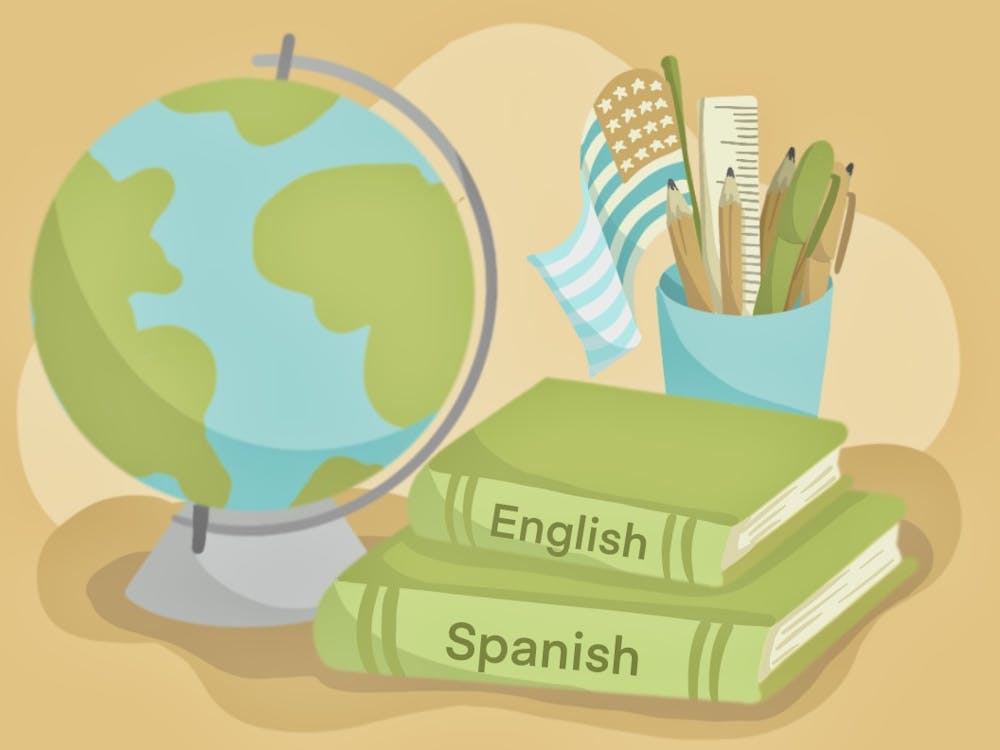Hector Rodriguez was never interested in learning English while living in Mexico. But since starting his post-doctorate at UF, he’s stepped up to the challenge to break the language barrier.
“Although my boss speaks Spanish, all the procedures and communications are in English,” Rodriguez said. ”It’s hard when you don’t speak it.”
Rodriguez is one of the students enrolled in Alachua County Public Schools’ adult English as a Second Language (ESOL) classes. Participation decreased during the COVID-19 pandemic, but the classes have managed to grow back to pre-pandemic levels.
Classes are from Monday through Thursday between 9 a.m. and 2 p.m. at the community center in Corry Village, a group of UF residential apartments. The registration fee is $30.
Rodriguez, 33, hadn’t learned English before because the classes were tedious, he said. After moving to Gainesville during the COVID-19 pandemic, he said, the ACPS classes were of the few available, and he felt encouraged to learn.
The ESOL classes offered by the public school system are dynamic and engaging, Rodriguez said.
“[The instructor] makes the classes very fun, very entertaining.” He said. “It is a great opportunity to start liking English.”
Jackie Johnson, ACPS’ spokesperson, wrote in an email that before the pandemic, the adult ESOL program used to have over 200 students — but that number went down significantly due to COVID-19 limitations of social distancing.
“We've built back up to between 100 to 120 students,” Johnson said. “We are also in the process of hiring another instructor so we can serve more students.”
The program is part of the adult education department. Students also have access to classes offered through the ACPS online adult high school, Johnson said, which is available in Spanish. The department also offers GED tests in Spanish, she said.
Yuko Uchida has been an instructor for about 25 years — almost half the program’s existence.
Uchida, 55, immigrated to the U.S. from Osaka, Japan, after finishing her master's degree in teaching English as a second language. Now, she’s the only instructor of the public school system’s adult ESOL program.
Uchida said the program was able to grow back quickly because of its high demand.
“There’s always a population that needs ESOL in the community,” she said.
The curriculum varies depending on the student’s English level, with levels available for beginners, low intermediate, high intermediate and advanced.
Classes are taught in two-hour blocks. They consist of practicing conversational English and learning new phrases and rules with the grammar and language books Uchida recommends for the course.
The program is associated with UF, Uchida said, because a lot of the students work with the university. Each semester, parents of UF students, graduate students or research scholars enroll in her classes.
The demographic of the classes is very diverse and changes based on the immigration patterns, Uchida said.
“A couple of years ago, almost half the class was from Brazil,” Uchida said. “Last semester we started getting more Ukrainian refugees.”
This semester, the class includes students who migrated from Korea, Ukraine, Venezuela, Egypt, Brazil, Mexico, Russia, China, Japan and Palestine.
The program also has the advantage of not requiring immigration documents.
“We are part of the public schools, so we are not allowed to check the visa status of the students,” Uchida said.
It’s common for Uchida’s students to transfer to the ESOL course at Santa Fe College once they receive a visa status or permanent residence, she said, because their program has a more elaborate curriculum.
SFC’s program only accepts permanent residents of the local community, said SFC ESOL department intake specialist, Edouard Oboukhov.
“The goal is developing English speaking skills of people who are living and ideally will stay in the Gainesville area,” he said.
For registration, Oboukhov said, students need to be U.S. citizens, provide documentation of applying for political asylum or show proof of living in the area for at least two years, like a lease.
Oboukhov understands the limitations of the program, he said, so when someone is interested in the Santa Fe program, he recommends other options — such as ACPS’ adult ESOL classes.
ACPS is committed to the success of every student, Johnson said, and that includes adult students for whom English is not their native language.
“Learning can and should be lifelong,” she said.
Contact Valentina at vsandoval@alligator.org. Follow her on Twitter @valesrc.
Valentina Sandoval is a fourth-year journalism major and the Summer 2024 Engagement Managing Editor. Whenever she's not writing, she's expanding her Animal Crossing island, making Spotify playlists or convincing someone to follow her dog on Instagram.





